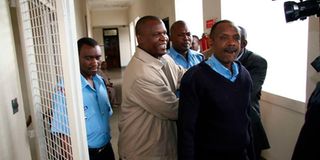High Court gives JSC 10 days to respond to Chitembwe’s petition

Justice Said Juma Chitembwe arrives at the Anti-Corruption Court in Nairobi on December 29, 2009. Petitions have been filed at the JSC calling for his dismissal.
The High Court has given the Judicial Service Commission (JSC) 10 days to respond to a petition by Justice Juma Chitembwe challenging the ongoing disciplinary proceedings against him.
Justice Hedwig Ong’undi directed the commission and five people who want Justice Chitembwe out of office to file their responses so that the case can proceed to a hearing.
“The respondents are given the last chance to file responses to the application and petition,” Justice Ong’undi said in Nairobi yesterday.
She added that the commission and the other respondents on January 9, 2022 were directed to file their replies but had not done so by yesterday.
Video evidence
The respondents are the JSC, former Nairobi Governor Mike Sonko, Francis Wambua (Sonko’s aide), Amana Said Jirani, Imgard Beige and David Leboss ole Kilusu.
Justice Chitembwe wants the High Court to stop the commission from hearing five petitions seeking his dismissal over corruption, misconduct and incompetence.
Through his lawyer Peter Wena, the judge also seeks to block the JSC from using video recordings, social media posts and phone conversations linking him to bribery as evidence.
The electronic evidence is from Mr Sonko.
The former city governor also posted the video clips and phone conversations on social media platforms.
Mr Wena says the clips cannot form the basis for Justice Chitembwe’s removal because they were obtained illegally.
He says the commission could rely on the recordings, “yet Mr Sonko obtained them in contravention of the Constitution”.
“The petitioner is aggrieved that the petitions for his removal from office and the proceedings by the JSC under Article 168(1) and (2) of the Constitution are based on the petitioner’s private conversations obtained without his consent and in violation of his rights to privacy,” Justice Chitembwe’s lawyer says in the court papers.
The judge is also challenging the manner in which the commission processed the petitions filed by Wambua, Beige and Kilusu.
Succession case
He says the foundation of the petitions is disputes that are still pending in court.
Justice Chitembwe contends that it was wrong for JSC to proceed to deal with the petitions “when there are substantive appeals pending in the Court of Appeal over the subject matter”.
For instance, the petition by Wambua and Sonko relates to a case involving the impeachment of the governor and a dispute is before the Appellate Court.
The judge adds that the petition by Beige and Kilusu arises from his ruling in a succession case that was filed at the High Court in Malindi.
This dispute too is pending at the Court of Appeal.
According to Justice Chitembwe, the processing of the petitions was in violation to fair administrative action under Article 168(1) and (2) of Kenya’s Constitution.
“Decisions made by the JSC in respect of the petitions and the proceedings have been taken without resort to any rules of procedure or practice, bearing in mind the commission’s failure to make regulations for the conduct of its proceedings,” Justice Chitembwe says in the court papers.
The judge adds that since the enactment of the Judicial Service Act (2011), the commission has not formulated procedural regulations for determining petitions for removing judges from office.
“The JSC has on several occasions stated that it is not a court of law and is not bound by rules of procedures,” he says.
“As a result of this, there is no uniform format for conducting proceedings, and that is against the rules of natural justice.”
The case will be mentioned on February 2 to confirm if the commission complied with the directive by filing the required papers and formalising its appearance in court.





